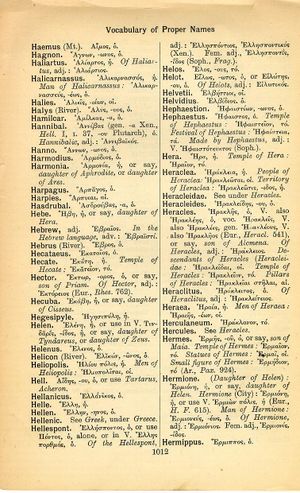Hannibal: Difference between revisions
Ἀναξαγόρας δύο ἔλεγε διδασκαλίας εἶναι θανάτου, τόν τε πρὸ τοῦ γενέσθαι χρόνον καὶ τὸν ὕπνον → Anaxagoras used to say that we have two teachers for death: the time before we were born and sleep | Anaxagoras said that there are two rehearsals for death: the time before being born and sleep
(6_7) |
(D_4) |
||
| Line 6: | Line 6: | ||
{{Lewis | {{Lewis | ||
|lshtext=<b>Hannĭbal</b>: ([[Annibal]]), ălis (ālis, Enn. Sat. 14 Vahl.), = Ἀννίβας [Phoen.],<br /><b>I</b> a Punic [[surname]]. The [[most]] [[celebrated]] of the [[name]] is [[Hannibal]], [[son]] of [[Hamilcar]], the [[leader]] of the Carthaginians in the [[second]] Punic [[war]], Nep. Han. 1 al.; Liv. 21, 1 al.; Hor. C. 4, 8, 16; Cic. de Or. 1, 48, 210 al.: et Romani suum Hannibalem habent, Liv. 27, 16, 10. —Prov.: [[Hannibal]] ad portas, of [[imminent]] and [[great]] [[danger]], Cic. Fin. 4, 9, 22: [[Mithridates]], [[odio]] in Romanos [[Hannibal]], a [[Hannibal]], Vell. 2, 18, 1. | |lshtext=<b>Hannĭbal</b>: ([[Annibal]]), ălis (ālis, Enn. Sat. 14 Vahl.), = Ἀννίβας [Phoen.],<br /><b>I</b> a Punic [[surname]]. The [[most]] [[celebrated]] of the [[name]] is [[Hannibal]], [[son]] of [[Hamilcar]], the [[leader]] of the Carthaginians in the [[second]] Punic [[war]], Nep. Han. 1 al.; Liv. 21, 1 al.; Hor. C. 4, 8, 16; Cic. de Or. 1, 48, 210 al.: et Romani suum Hannibalem habent, Liv. 27, 16, 10. —Prov.: [[Hannibal]] ad portas, of [[imminent]] and [[great]] [[danger]], Cic. Fin. 4, 9, 22: [[Mithridates]], [[odio]] in Romanos [[Hannibal]], a [[Hannibal]], Vell. 2, 18, 1. | ||
}} | |||
{{Gaffiot | |||
|gf=<b>Hannĭbăl</b>,⁹ ălis, m., fils d’[[Hamilcar]], chef des Carthaginois dans la seconde guerre punique : Nep. Hann. ; Cic. ; Liv. || [[Hannibal]] ad portas Cic. Fin. 4, 22, [[Hannibal]] à [[nos]] portes = danger pressant. | |||
}} | }} | ||
Revision as of 06:47, 14 August 2017
English > Greek (Woodhouse)
Ἀννίβις (gen. -α Xen., Hell. I, I. 37, -ου Plutarch), ὁ.
Hannibalic, adj.: Ἀννιβαϊκός.
Latin > English (Lewis & Short)
Hannĭbal: (Annibal), ălis (ālis, Enn. Sat. 14 Vahl.), = Ἀννίβας [Phoen.],
I a Punic surname. The most celebrated of the name is Hannibal, son of Hamilcar, the leader of the Carthaginians in the second Punic war, Nep. Han. 1 al.; Liv. 21, 1 al.; Hor. C. 4, 8, 16; Cic. de Or. 1, 48, 210 al.: et Romani suum Hannibalem habent, Liv. 27, 16, 10. —Prov.: Hannibal ad portas, of imminent and great danger, Cic. Fin. 4, 9, 22: Mithridates, odio in Romanos Hannibal, a Hannibal, Vell. 2, 18, 1.
Latin > French (Gaffiot 2016)
Hannĭbăl,⁹ ălis, m., fils d’Hamilcar, chef des Carthaginois dans la seconde guerre punique : Nep. Hann. ; Cic. ; Liv.

